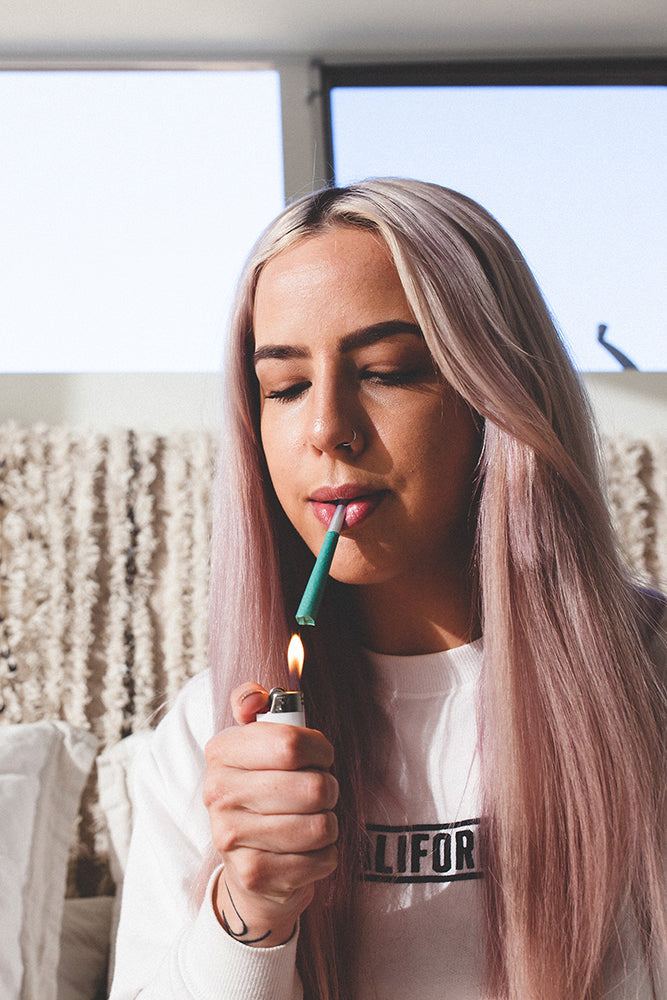Have you ever wondered about the story behind the term “420” and its connection to cannabis culture?
In this blog post, the Kush Queen team is going to take you on a journey through the fascinating history of 420 meaning, from its humble beginnings as a secret code among friends to its evolution into a global cultural phenomenon.
So sit back, relax, and prepare to be enlightened as we explore the rich tapestry of events, traditions, and myths that have shaped the world of 420 and cannabis culture as we know it today. And what better way to elevate your experience than enjoying a few THC gummies or CBD gummies while you read along?
Short Summary
- 420 is a powerful symbol of cannabis culture, tracing back to San Rafael High School’s Waldos and spreading through the Grateful Dead community.
- Celebrate 420 with events, concerts, promotions & more! Hippie Hill in SF is perfect for coming together & celebrating love for marijuana.
- Debunk myths - “420” has nothing to do with police codes but rather originates from search by group of friends for abandoned cannabis crop!
The Origin of 420: San Rafael High School
The origin of 420 can be traced back to a group of high school students in San Rafael, California, who called themselves “the Waldos” and used the code to plan their search for an abandoned cannabis crop. The Waldos’ story began in the early 1970s when they decided to embark on a treasure hunt for this elusive crop, using a map handed down by a friend whose brother was in the Coast Guard.
Although they never found the crop, the Waldos continued to use the code 420 as a way to communicate their plans to collectively smoke pot and smoke marijuana, and it wasn’t long before the term started to spread beyond their close-knit circle.
The Waldos
The Waldos were a group of five students who attended San Rafael High School and shared a common interest in marijuana. They used the code “420” to secretly talk about their plans to smoke, initially meeting up at 4:20 pm by a statue of chemist Louis Pasteur on the school grounds. The statue soon became their regular meeting spot, and the time 4:20 pm their designated “safari” time for seeking out the abandoned cannabis crop near Point Reyes.
Though they never found the crop, the code “420” remained a symbol of their shared passion for marijuana and the adventures it brought them. It has since become a popular code for marijuana use and culture around the world.
The Abandoned Cannabis Crop
The Waldos’ quest for the abandoned cannabis crop was fueled by the promise of free marijuana and the thrill of the hunt. Despite their best efforts, they never located the elusive crop, but the term “420” lived on as a secret code for marijuana use among the group.
As time went on, the Waldos continued to use 420 as a way to communicate their plans to smoke, and the term began to spread beyond their circle of friends, eventually reaching the ears of the Grateful Dead community.

The Grateful Dead Connection
The term 420 gained traction in the Grateful Dead community after the Waldos befriended the band’s bassist, Phil Lesh. The Grateful Dead were known for their close ties to cannabis culture, and their fans were quick to adopt the term as a symbol of unity and empowerment in their fight for the legalization of marijuana.
The association between 420 and the Grateful Dead played a significant role in the term’s rise to prominence, helping to spread it far and wide throughout the cannabis community and beyond.
The Evolution of 420: From Code to Cultural Phenomenon
Over the years, 420 evolved from a secret code among a group of friends to a cultural phenomenon, representing cannabis culture and the fight for marijuana legalization. This evolution can be attributed to the term’s spread through the Grateful Dead community and its promotion by High Times Magazine, which published articles about 420 and advocated for the regulation of marijuana.
As 420 gained popularity, it became a symbol of cannabis culture, with people around the world participating in events and traditions to celebrate the cannabis plant and its unique history.
Spreading through the Grateful Dead Community
The Grateful Dead community played a crucial role in the popularization of 420 by incorporating the term into their music and concerts. Fans of the band, who were often known for their love of marijuana, eagerly adopted the term to express their passion for cannabis and their support for the movement to legalize it.
As the Grateful Dead toured the country, the term 420 spread with them, becoming a unifying symbol for cannabis enthusiasts from coast to coast.
High Times Magazine and Beyond
The widespread adoption of the term 420 was further fueled by High Times Magazine, which published articles about the Waldos’ story and promoted 420 events. The magazine’s advocacy for marijuana legalization and its promotion of cannabis culture helped to establish 420 as a symbol of unity and empowerment for marijuana enthusiasts everywhere.
Today, 420 is celebrated around the world by millions of people who come together to enjoy their favorite plant and advocate for its legalization.
420 as a Symbol of Cannabis Culture
420 has become an iconic symbol of cannabis culture, uniting marijuana enthusiasts from all walks of life in their shared passion for the plant and its many benefits. As a symbol of the fight for marijuana legalization, 420 has inspired countless individuals to join the movement and advocate for change, both in their local communities and on a global scale.
From its humble beginnings as a code among a group of high school friends to its current status as a worldwide phenomenon, 420 has left an indelible mark on the world of cannabis and will continue to do so for generations to come.
At Kush Queen, continuing to ensure the culture of cannabis, and its California origins are part of our mission.
Celebrating 420: Events and Traditions
420 is celebrated with a wide array of events and traditions that bring cannabis enthusiasts together to enjoy their favorite plant and advocate for its legalization. From gatherings at iconic locations like Hippie Hill in San Francisco to enjoying weed gummies at music festivals and concerts dedicated to the plant, 420 celebrations offer a unique opportunity for marijuana lovers to connect with like-minded individuals and express their passion for cannabis cultureIn addition to these events, dispensaries also offer special deals and promotions to mark the occasion, providing yet another way for enthusiasts to celebrate their favorite plant.
Hippie Hill in San Francisco
Hippie Hill, located in San Francisco’s Golden Gate Park, not far from Marin County, is a popular gathering spot for 420 celebrations. Every year on April 20th, thousands of marijuana enthusiasts flock to the park to enjoy a day of music, festivities, and, of course, plenty of marijuana.
With its relaxed atmosphere and stunning views of the city, Hippie Hill provides the perfect setting for cannabis lovers to come together and celebrate their shared passion for the plant.
Music Festivals and Concerts
In addition to gatherings at iconic locations like Hippie Hill, music festivals and concerts often take place on or around April 20 to celebrate cannabis culture and the vibrant community it has fostered. Events such as the Mile High 420 Festival in Denver, the 420 Music Fest in Detroit, and the SweetWater 420 Fest in Atlanta showcase a diverse lineup of bands and artists, attracting marijuana enthusiasts from across the country and beyond.
These events not only provide a platform for talented musicians, but also serve as a powerful reminder of the enduring impact of cannabis culture on the world of music and entertainment.

420 Season At Dispensaries, Buckle Up For Crazy Hot Deals
To mark the occasion of 420, many dispensaries offer special deals and promotions on a wide range of cannabis products, from ounces and concentrates to edibles and more. These promotions provide marijuana enthusiasts with the opportunity to try new products, stock up on their favorites, and celebrate the day in their own way.
The availability of such deals and promotions highlights the growing acceptance of cannabis culture and the continued push for legalization, as well as the burgeoning marijuana industry that has emerged in recent years.
The Impact of Marijuana Legalization on 420
As marijuana becomes increasingly legalized across the United States, the meaning and celebration of 420 have evolved to reflect the shifting landscape of cannabis culture. With the growing acceptance of marijuana use for both recreational and medicinal purposes, 420 has become an opportunity for activists and advocates to push for further legalization and reform, as well as a time for enthusiasts to come together and celebrate the plant they love.
In this new era of marijuana legalization, the impact of 420 can be seen in a variety of ways, from advocacy and activism to changes in consumption habits and the commercialization of the holiday itself.
Advocacy and Activism
In the wake of marijuana legalization, 420 has become a powerful platform for activists to advocate for further reform and change. The day has increasingly been used as an opportunity for protests, rallies, and other events aimed at raising awareness about the need for marijuana legalization and the injustices of the current drug policy.
By harnessing the power of 420, activists hope to bring about meaningful change and legalize cannabis, creating a more just and equitable future for all who use and enjoy cannabis.
Changes in Cannabis Consumption
The legalization of marijuana, including medical marijuana, has led to significant changes in cannabis consumption habits, with a wider variety of products and methods available to consumers than ever before. As efforts to regulate marijuana progress, enthusiasts, including marijuana smokers, are exploring new ways to enjoy the plant, from vaporizers and edibles to tinctures and topicals.
These changes in consumption habits reflect the growing diversity and sophistication of the cannabis market, as well as the continued evolution of 420 as a celebration of all things marijuana.
From our POV, cannabis is self care. When you think about all the different ways to consume cannabinoids from soaking in a CBD bath bomb to taking a daily wellness gummy to boost your mood, delivery methods and wellness-focused practices have come such a long way from the 70s.

The Commercialization of 420
The commercialization of 420 has become a contentious issue within the cannabis community, with some expressing concern about the potential negative effects of big business on cannabis culture. As marijuana becomes increasingly legalized and mainstream, businesses have been quick to capitalize on the holiday, sponsoring events and promoting 420 as a marketing opportunity.
While this commercialization has helped to raise awareness about cannabis and the fight for legalization, it has also sparked debate about the potential commodification of cannabis culture and the influence of corporate interests on the future of the plant and its community.
420-Friendly Spaces and Destinations
For those who wish to consume cannabis without fear of judgment or legal repercussions, 420-friendly spaces and destinations provide a welcoming environment in which to enjoy the plant and connect with like-minded individuals. From 420-friendly lodging options and cannabis events and tours to the most 420-friendly cities in the US, there are countless ways for marijuana enthusiasts to celebrate their passion for the plant and immerse themselves in the vibrant world of cannabis culture.
Whether it’s attending a cannabis-infused dinner party, exploring a cannabis-friendly city, or simply enjoying a joint in the comfort of your own home, there are plenty of ways to enjoy cannabis in a safe and responsible manner. With the right resources and knowledge, cannabis enthusiasts can enjoy cannabis.
One of our favorite destinations, 420 or not, is to indulge in a Cannacure at the Los Angeles based nail salon chain, BellaCures. For the past 5 years, BellaCures has offered the, now famous, Canncure which is a cannabis-infused mani or pedi service featuring multiple Kush Queen products. OMG, the Cannacure is the most relaxing, a 420 must do when you are in LA!
420-Friendly Lodging
420-friendly lodging options, such as hotels, bed and breakfasts, and vacation rentals, cater to guests who wish to consume cannabis on the premises. These accommodations often offer unique extras like wake and bake breakfasts, cannabis farm tours, and CBD-infused massages, providing a memorable and enjoyable experience for marijuana enthusiasts.
By offering a safe and welcoming environment in which to enjoy cannabis, 420-friendly lodging helps promote the acceptance and normalization of marijuana use, both within the cannabis community and beyond.
Cannabis Events and Tours
Cannabis events and tours offer a unique opportunity for enthusiasts to explore the world of marijuana in a welcoming and supportive environment. These organized activities often involve visits to cannabis-related businesses, educational presentations, and opportunities to sample a variety of cannabis products.
By participating in such events, cannabis aficionados can deepen their understanding of cannabis culture, connect with fellow marijuana lovers, and create lasting memories of their 420 experiences.
Most 420-Friendly Cities in the US
The most 420-friendly cities in the US are often found on the West Coast, where marijuana laws tend to be more relaxed and the cannabis culture is more deeply ingrained. Cities like San Francisco, Los Angeles, and Seattle have long been known for their welcoming attitude towards marijuana use, offering a range of 420-friendly spaces, events, and businesses for enthusiasts to enjoy. Although, the East Coast and Central US cannabis scenes have been thriving with the rise of New York, Illinois and Colorado as growing markets with dense cannabis-user populations.
As marijuana legalization continues to spread across the country, it is likely that even more cities will embrace the 420-friendly lifestyle, further expanding the opportunities for pot smokers and other cannabis enthusiasts to connect, celebrate, and advocate for their favorite plant.
Debunking Common 420 Myths
Despite the widespread popularity of 420, there are still many myths and misconceptions surrounding its origin and meaning. From police codes and legal references to musical connections and unrelated historical events, these myths often serve to obscure the true story of 420 and its significance within the cannabis community.
In this section, we’ll debunk some of the most common 420 myths and set the record straight on the fascinating history of this iconic term.
Police Codes and Legal References
Contrary to popular belief, the term 420 is not related to police codes or legal references. While it is true that some police departments use the code “420” to signify marijuana-related incidents, this usage is not the origin of the term.
The true story of 420 lies in the adventures of the Waldos, a group of high school friends who used the code to plan their search for an abandoned cannabis crop and to communicate their plans to smoke marijuana.

Bob Dylan and Other Musical Connections
Another common myth surrounding the origin of 420 is the supposed connection to Bob Dylan and other musicians. Some people believe that the term 420 was inspired by Bob Dylan’s song “Rainy Day Women #12 & 35,” as the product of the numbers 12 and 35 is 420. However, there is no evidence to support this claim.
The true origin of 420 can be traced back to the Waldos and their adventures in search of an abandoned cannabis crop.
Unrelated Historical Events and Figures
Finally, some have falsely connected 420 to unrelated historical events and figures, such as Adolf Hitler’s birthday on April 20th. While it is an unfortunate coincidence that Hitler’s birthday falls on the same day as the celebration of 420, there is no connection between the two.
The true story of 420 is rooted in the adventures of the Waldos and their quest for a hidden cannabis crop, a story that is far removed from the dark history of Hitler and his regime.
Summary
The story of 420 is a fascinating tale that spans decades, encompassing the adventures of the Waldos, the Grateful Dead, and the global cannabis community. From its humble beginnings as a secret code among friends to its current status as a cultural phenomenon and symbol of marijuana legalization, 420 has left an indelible mark on the world of cannabis.
As we continue to celebrate and advocate for this remarkable plant, let us remember the history of 420 and the enduring spirit of unity and empowerment it represents.







